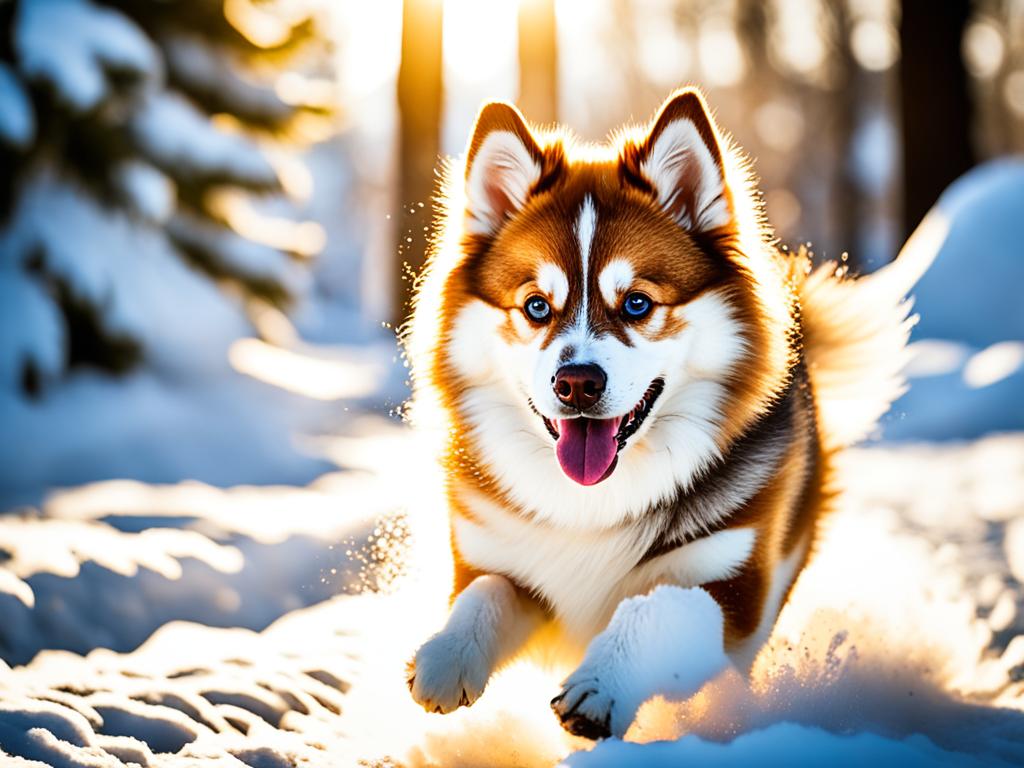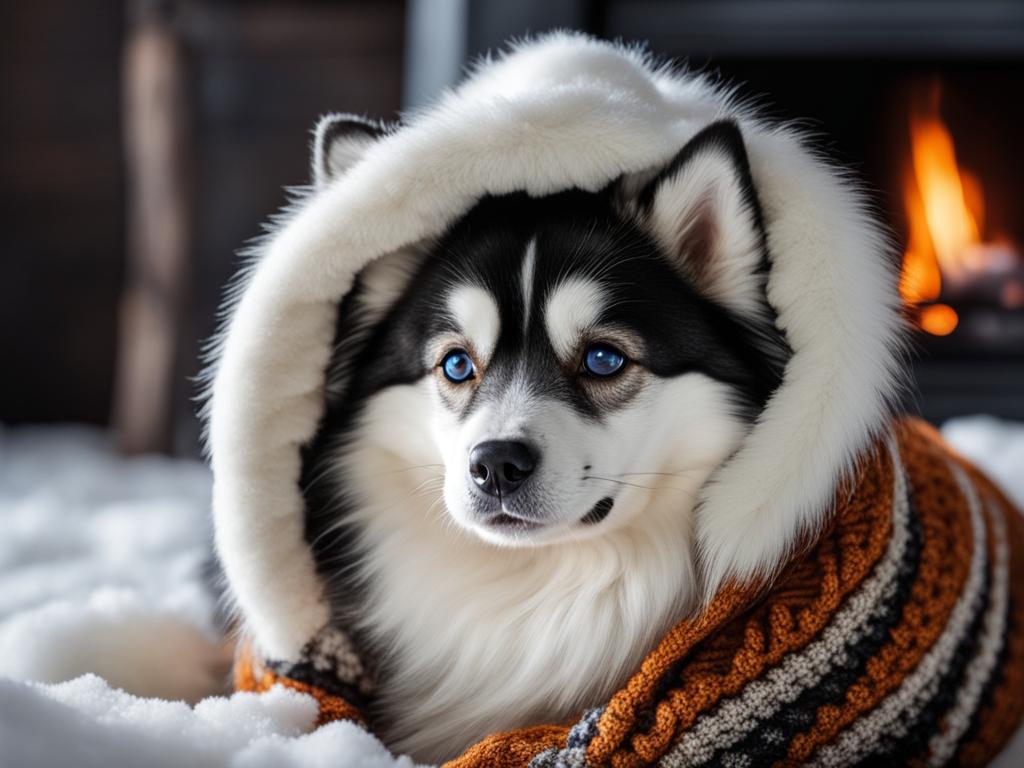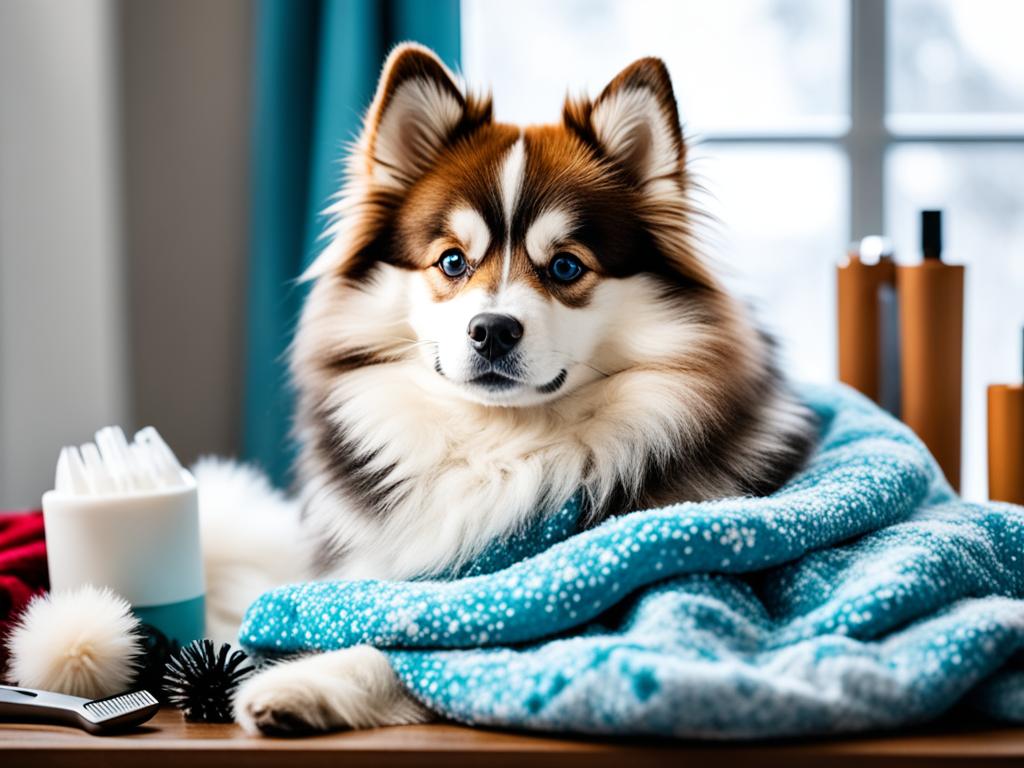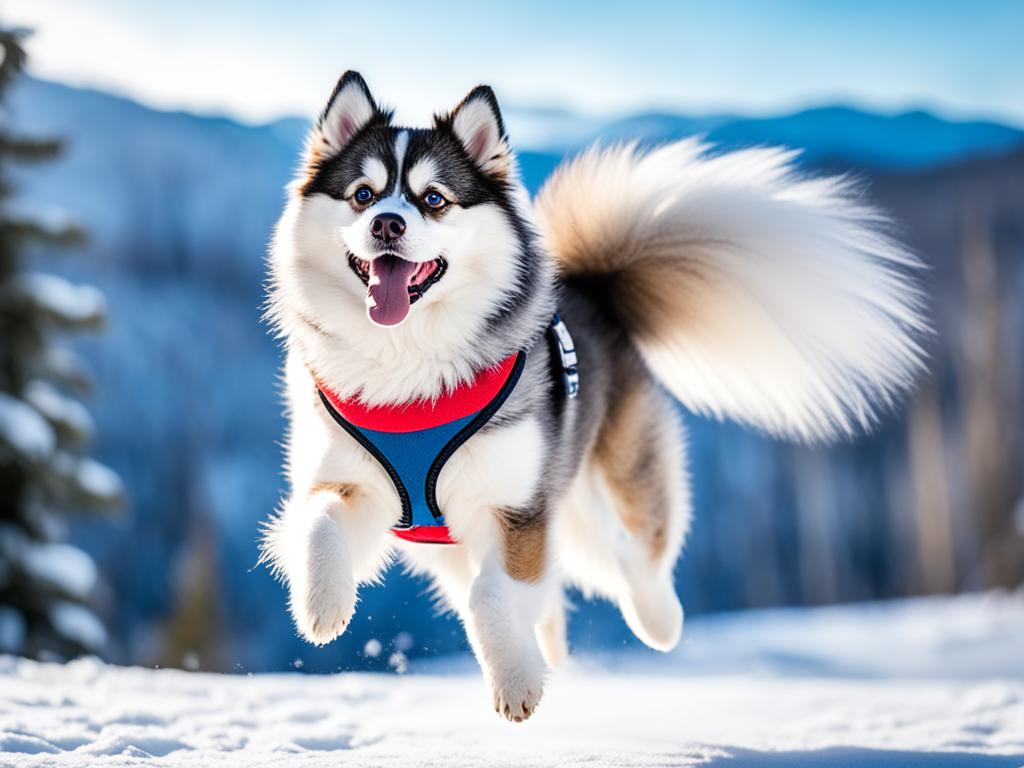Did you know that Pomskies, the adorable hybrid breed of Pomeranians and Siberian Huskies, require extra care during the winter months? Despite their Husky lineage, Pomskies have a thinner coat than purebred Huskies, making them more susceptible to the cold. It’s crucial to provide them with the proper care and attention to ensure their safety and well-being. In this article, we’ll share essential winter care tips for your Pomsky, so you can keep them warm and healthy all season long.
Key Takeaways:
- Protect your Pomsky’s paws from cold temperatures and harmful substances by wiping them clean and moisturizing with a natural restoring balm.
- Ensure your Pomsky gets sunlight and outdoor playtime during the winter, but watch out for hidden hazards in the snow.
- To prevent dry skin, regularly massage coconut oil into your Pomsky’s coat and use a humidifier to maintain moisture in the air.
- Ensure that heat sources in your home are safe and out of reach to prevent burns.
- Be mindful of snow piles and icicles to avoid accidents and injuries when your Pomsky is playing outside.
Protecting Your Pomsky’s Paws
The paws are particularly vulnerable to cold temperatures and harsh conditions during winter. To protect your Pomsky from extreme cold weather, it is important to take special care of their paws. Here are some health care tips for winter:
- Wipe their paws clean: After each walk, gently wipe your Pomsky’s paws with a damp cloth to remove any salts or chemicals that may be present on roads or sidewalks. This prevents irritation and potential ingestion of harmful substances when they lick their paws.
- Moisturize their paws: Apply a natural restoring balm to your Pomsky’s paws to keep them moisturized. This helps prevent dryness and cracking caused by cold temperatures and dry winter air.
- Trim the paw fur: Trim the fur between your Pomsky’s paw pads to minimize the accumulation of snow and ice. This reduces the risk of snow getting packed and causing discomfort or frostbite.
- Consider using boots: For added protection, you may want to consider using boots designed specifically for dogs. These boots provide insulation and prevent contact with icy or salty surfaces. However, not all dogs are comfortable wearing boots, so assess your Pomsky’s tolerance and comfort level before making a decision.
By following these health care tips for winter, you can protect your Pomsky’s paws from extreme cold weather and ensure their overall well-being.
Importance of Protecting Your Pomsky’s Paws
Pomskies are a crossbreed between Pomeranians and Siberian Huskies. While they may have inherited some cold-resistant traits from their Husky lineage, they still retain characteristics from their Pomeranian ancestry, which has a thinner coat. This makes them more susceptible to the adverse effects of extreme cold weather.
The paws are in direct contact with the ground, making them vulnerable to freezing temperatures, icy surfaces, and harmful chemicals used for snow and ice removal. Failure to protect your Pomsky’s paws can lead to discomfort, dryness, cracking, frostbite, and other paw-related issues.
Take proactive measures to protect your Pomsky’s paws during winter, as it is an essential part of their overall health care.
Sunlight and Outdoor Play
Taking your Pomsky for walks during daylight hours can provide them with much-needed sunlight and warmth. Sunlight provides both you and your Pomsky with vitamin D and extra warmth during your outdoor ventures.
It is also important to encourage outdoor play in short durations to keep your Pomsky active and engaged. Regular physical activity is crucial for their overall health and well-being. However, it’s important to ensure that your Pomsky doesn’t overexert themselves or spend too much time in cold temperatures, as they can be sensitive to extreme weather conditions.
During your outdoor adventures with your Pomsky, it’s important to be cautious of any potential hazards hidden in the snow. Keep an eye out for garbage or animal droppings that may pose risks to your Pomsky’s health. Clean up their play area to ensure they have a safe and enjoyable time outdoors.
Remember to dress your Pomsky appropriately for the weather with a winter coat or sweater to keep them warm during your outdoor activities.
| Benefits of Sunlight | Outdoor Play Tips | Outdoor Hazards to Avoid |
|---|---|---|
|
|
|

Keeping your Pomsky active and allowing them to enjoy the outdoors can greatly contribute to their physical and mental well-being during the winter season.
Preventing Dry Skin
Just like humans, dogs can experience dry skin during winter. This can cause discomfort and itchiness for your Pomsky. To prevent dryness in your Pomsky’s skin, there are a few winter grooming tips you can follow:
1. Regularly Massage Coconut Oil
Coconut oil is a natural moisturizer that can help nourish your Pomsky’s skin and prevent dryness. Massage a small amount of coconut oil into their coat regularly to keep their skin hydrated. This will also help maintain a healthy and lustrous coat.
2. Run a Humidifier
Running a humidifier in your home can help combat the dry air that is common during winter. The humidifier adds moisture to the air, preventing it from sapping moisture from your Pomsky’s skin. This can help reduce the chances of dry skin and irritation.
Remember to clean and maintain your humidifier regularly to avoid the buildup of mold or bacteria.
By following these winter grooming tips, you can help keep your Pomsky’s skin moisturized and healthy throughout the colder months.
| Grooming Tip | Description |
|---|---|
| Massage Coconut Oil | Regularly massaging coconut oil into your Pomsky’s coat can help moisturize their skin and prevent dryness. |
| Run a Humidifier | Running a humidifier in your home can add moisture to the air and prevent dry skin in your Pomsky. |
Protecting from Heat Sources
During winter, your Pomsky may seek out heat sources for warmth. It is important to ensure that all heat sources in your home are safe and not at risk of causing burns. Take precautions such as placing space heaters out of reach, covering baseboard heaters, and creating a barrier around the fireplace to keep your Pomsky safe from potential harm.

One way to protect your Pomsky from potential burns is by using Pomsky winter accessories. These accessories not only keep your Pomsky warm but also provide an extra layer of protection. Here are some essential winter accessories to consider for your Pomsky:
- Coats and Sweaters: Invest in a well-fitted coat or sweater for your Pomsky to keep them insulated against the cold weather. Look for options that are specifically designed for smaller breeds or Pomskies.
- Booties: Booties can protect your Pomsky’s paws from freezing temperatures, ice, and harmful chemicals present on the ground. Choose booties that have a non-slip sole and ensure they fit securely on your Pomsky’s paws.
- Heated Beds: Provide your Pomsky with a comfortable and heated bed to keep them warm and cozy during winter nights. Look for beds with removable and washable covers for easy maintenance.
- Snoods: A snood is a type of winter accessory that covers your Pomsky’s neck and ears, providing added warmth and protection. It also helps prevent snow and ice from sticking to their fur.
By using these winter accessories, you can ensure that your Pomsky stays warm and safe from potential burns or injuries caused by heat sources.
Snow Piles and Icicles
When it comes to winter care tips for Pomskies, it’s important to be mindful of potential dangers that snow piles and icicles can pose to your furry friend. When shoveling snow, be cautious of where you place the snow piles, as Pomskies may view them as an opportunity to jump onto higher structures. This can be unsafe and potentially lead to injuries. Additionally, it’s crucial to remove icicles from the roof and balconies to prevent them from falling on your Pomsky while they are playing outside.

| Tip 1 | When shoveling snow, make sure to place the snow piles away from areas where your Pomsky can access. |
|---|---|
| Tip 2 | Regularly check for icicles on your property and remove them immediately to prevent any potential accidents. |
| Tip 3 | Ensure your Pomsky’s outdoor play area is clear of any hazards, including snow piles or icicles. |
| Tip 4 | Supervise your Pomsky while they are playing outside to prevent them from coming into contact with snow piles or icicles. |
Physiological Changes in Pomskies
During winter, Pomskies experience various physiological changes to adapt to the cold temperatures. One notable change is the thickening and fluffing of their coat, which provides extra insulation against the cold. This natural adaptation helps to keep them warm and protected during the colder months.
To ensure your Pomsky stays comfortable and healthy, it is important to regularly brush their coat. Brushing helps to remove any loose hair, prevent matting, and maintain their coat’s insulation properties. It also promotes blood circulation and distributes natural oils, keeping their skin moisturized. Regular brushing is especially important for Pomskies during winter, as their thicker coat is more prone to tangling and matting.
Additionally, proper grooming practices like bathing and trimming are essential to maintain your Pomsky’s coat health in winter. Bathing should be done as needed, using a mild shampoo specifically formulated for dogs. It is important to thoroughly dry their coat after bathing to prevent them from getting chilled. Trimming the hair around their paws and ears can also help prevent ice and snow buildup, reducing the risk of discomfort or frostbite.
With the physiological changes that Pomskies undergo during winter, it is crucial to implement proper grooming routines to keep their coat in optimal condition and ensure their well-being throughout the season.
Behavioral Changes in Pomskies
In addition to physiological changes, winter can also affect the behavior of your Pomsky. Understanding these changes can help you provide the necessary care and attention your Pomsky needs during the winter months.
Lethargy
During winter, Pomskies may exhibit increased lethargy. The cold weather can make them feel less active and motivated. It’s important to adjust their exercise routine accordingly and provide mental stimulation through interactive toys and games.
Clinginess
Pomskies may become more clingy during winter, seeking comfort and warmth from their owners. This behavior is natural as they try to stay cozy. Ensure you give them extra attention and provide a warm and comfortable space where they can feel safe and secure.
Increased Sleep
Winter often results in Pomskies sleeping more than usual. The colder temperatures may cause them to conserve energy and spend more time resting. Allow for extra sleep and make sure they have a cozy bed or blanket to keep them warm.
Fear of Going Outside
The cold weather and snow can sometimes make Pomskies hesitant to go outside. They may have a fear of the unfamiliar textures and temperatures. To ease their anxiety, gradually introduce them to the outdoor environment by starting with short walks and gradually increasing the duration.

By understanding the behavioral changes that Pomskies may experience during winter, you can ensure their well-being and provide the necessary care they need to stay happy and healthy throughout the colder months.
Can Pomskies Withstand Cold Temperatures?
While Pomskies may have some traits from the Siberian Husky, known for their ability to withstand cold temperatures, they also retain characteristics from the Pomeranian, which has a thinner coat. This means that Pomskies may not tolerate extreme cold weather conditions as well as purebred Huskies. It is important to take appropriate measures to keep your Pomsky warm and comfortable during winter.
The Importance of Pomsky Breed Care During Winter
Understanding the unique needs of your Pomsky during winter is crucial to ensure their well-being. While they may have some natural adaptability to the cold, their mixed breed genetics mean that they may require extra care and attention when temperatures drop.
Pomsky Health Care Tips for Winter
Here are some essential tips to help you care for your Pomsky’s health during the winter months:
- Provide a cozy shelter: Create a warm and comfortable space for your Pomsky to retreat to during the colder days. Consider using a heated pet bed or providing extra blankets to help regulate their body temperature.
- Dress them up: Invest in a well-fitting coat or sweater specifically designed for dogs to provide an extra layer of insulation. This will help keep your Pomsky warm during walks or outdoor activities.
- Limit outdoor time: While it’s important for Pomskies to get exercise and fresh air, it’s crucial to be mindful of the temperature and weather conditions. Limit their time spent outdoors, especially during extremely cold or windy days.
- Protect their paws: Cold pavement and snow can be harsh on your Pomsky’s paws. Consider using booties to protect their feet from frostbite and chemical irritants like road salts.
- Maintain a balanced diet: During winter, Pomskies may require extra calories to help maintain their body heat. Consult with your veterinarian to adjust their food intake accordingly.
- Keep them hydrated: Although it may not be as noticeable as during warmer months, proper hydration is crucial for your Pomsky’s overall health. Ensure they have access to fresh water at all times.
- Regular grooming: Regular brushing not only helps maintain your Pomsky’s coat health but also stimulates blood circulation, keeping them warm. Additionally, ensure their ears are dry and clean to prevent infections.
Tips to Keep Your Pomsky Warm During Winter
When it comes to keeping your Pomsky safe in winter, there are essential tips you should follow to ensure their well-being. First and foremost, dress your Pomsky in a coat or sweater to provide them with an extra layer of insulation against the cold. This will help keep their body temperature regulated and prevent them from getting too chilly.
Creating a warm place for your Pomsky to sleep is crucial during the winter months. Ensure they have a comfortable bed or blanket in a draft-free area of your home. This will help them stay cozy and provide a peaceful rest during the colder nights.
While it’s important for your Pomsky to get some outdoor exercise, it’s equally vital to limit their time spent outside in extreme cold weather. If the temperature drops too low or the weather conditions become harsh, consider shortening the duration of their outdoor activities to prevent them from experiencing discomfort or potential health issues.
Winter accessories such as booties can play a significant role in protecting your Pomsky’s feet. These accessories not only shield their paws from cold surfaces but also provide traction on slippery ice or snow. Additionally, booties can help prevent irritation caused by salts and chemicals commonly found on roads and sidewalks.
Lastly, increasing your Pomsky’s food intake during winter can help maintain their body temperature. Providing them with a slightly higher amount of food can give them the additional energy needed to stay warm. Consult with your veterinarian to determine the appropriate increase in their food portion to avoid overfeeding.
By following these essential tips and providing your Pomsky with winter accessories and extra care, you can ensure that they stay safe, warm, and healthy throughout the colder months.
FAQ
How can I protect my Pomsky’s paws during the winter?
To protect your Pomsky’s paws, make sure to wipe them clean after walks to remove any salts or chemicals. You can also moisturize the paws with a natural restoring balm and trim the fur between the paw pads. Consider using boots for added protection if your Pomsky is comfortable wearing them.
Why is sunlight important for my Pomsky during winter?
Sunlight provides vitamin D and extra warmth for both you and your Pomsky. Taking your Pomsky for walks during daylight hours can help provide the sunlight and warmth they need. Outdoor play in short durations can also keep your Pomsky active and engaged.
How can I prevent dry skin in my Pomsky during winter?
Regularly massaging coconut oil into your Pomsky’s coat can help prevent dryness. Running a humidifier in your home can also maintain moisture in the air and reduce the chances of dry skin for your Pomsky.
How do I protect my Pomsky from heat sources in my home during winter?
Ensure that all heat sources in your home are safe and not at risk of causing burns. Place space heaters out of reach, cover baseboard heaters, and create a barrier around the fireplace to keep your Pomsky safe from potential harm.
How should I handle snow piles and icicles to protect my Pomsky?
When shoveling snow, be mindful of where you place the snow piles to prevent your Pomsky from using them as a jumping point. Additionally, remove icicles from the roof and balconies to avoid any accidents or injuries that may occur if they fall on your Pomsky while playing outside.
What are some physiological changes Pomskies go through during winter?
During winter, Pomskies develop a thicker and fluffier coat to provide extra insulation against the cold. Regularly brushing your Pomsky’s coat can help prevent matting and tangling.
Are there any behavioral changes in Pomskies during winter?
Yes, some common behavioral changes include lethargy, clinginess, increased sleep, and a fear of going outside due to the cold or snow. Understanding these changes can help you provide the necessary care and attention your Pomsky needs during the winter months.
Can Pomskies tolerate extreme cold temperatures?
While Pomskies may have some traits from the Siberian Husky, known for their ability to withstand cold temperatures, they also retain characteristics from the Pomeranian, which has a thinner coat. This means that Pomskies may not tolerate extreme cold weather conditions as well as purebred Huskies, so it’s important to take appropriate measures to keep them warm and comfortable.
What are some tips to keep my Pomsky warm during winter?
Dress your Pomsky in a coat or sweater, provide a warm place to sleep, limit their time spent outdoors, consider using booties to protect their feet, and increase their food intake to help maintain their body temperature.

Leave a Reply